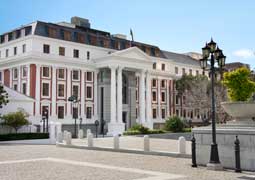
The debate on State Capture, a matter that has captured our country’s political imagination, was always going to be emotive and it lived up to expectations. Emotions ran high during the debate, the more so as recently the state-owned enterprises’ poor performance led to a further investment rating downgrade.
In the light of the above, the Chief Whip of the Opposition Party, the Democratic Alliance’s Mr John Steenhuisen, saw fit to initiate a debate in the National Assembly on the scourge of state capture and Parliament’s duty to investigate and hold the executive to account.
The debate’s importance is vindicated by the ongoing denial of state capture, said Mr Steenhuisen. “They not only stopped at that, they threatened that this debate would not go ahead. That is proof why this debate is so essential. I think we should start, as honourable Gordhan has said before, to “join the dots.”
One has to ask: whose interest are these members are serving? Or is theirs an act subservience, he asked. “Certainly, not the people of South Africa, certainly not our democracy and definitely not this Parliament. Their is nothing more than a poorly executed dance of subservience to the Gupta masters who are no doubt carefully choreographing this charade.”
What makes this debate even more significant is the criticism levelled by the newly published report of the High Level Panel, which was charged with the task of assessing the impact of legislation passed since 1994, Mr Steenhuisen said. “It is a fascinating document that should be compulsory reading for every member. It is an indictment on the failure of this House and a major wake-up call for all of us. The panel calls on us for much more effective oversight of the executive and for a more activist Parliament, not simply a rubber stamp processing the work of the executive.”
We take the issue of state capture seriously and we won’t shy away from all challenges confronting our young democracy, said the African National Congress’ Ms Lusizo Makhubela-Mashele.
“Over the past few months, the eyes of the nation have been fixed on Parliament, particularly the oversight work than many committees have conducted. The Ad Hoc Committee of the South African Broadcasting Corporation (SABC) Board is one of them, which shows that Parliament is working tirelessly to ensure accountability and good governance. Today, those who captured the SABC have been brought to book and some shown the door.”
The Economic Freedom Fighters’ Mr Thembinkosi Rawula said we now know as a fact that corruption is taking place at an industrial scale. However, despite concrete evidence of corruption by Guptas at Eskom, it is us citizens who pay exorbitant electricity tariffs. “Even when it is reported that Eskom does not have money and is likely to run out of cash in six months, some of the contracts that facilitate industrial-scale looting continue despite all the evidence. While we sit here and debate the scourge of state capture, there are payments that are being made to Gupta companies in a web of fraud and racketeering.”
State capture is an economic crime against the citizens of this country and should be treated as such. And it has even been quantified to a tune of R150 billion, said Mr Mandlenkosi Mabika of the National Freedom Party. “With that amount, South Africa would have been able to build 2 000 schools, 1 250 hospitals and 1.5 million reconstruction and development programme houses.” State capture has eroded trust in public institutions, yet Parliament’s response to this saga has been lukewarm at best, he said.
State capture has infiltrated the core structures since Mr Zuma has ascended to the highest office in the land, said United Democratic Movement’s Mr Mncedisi Filtane. “The evil act meted against the poorest of the poor has become institutionalised. Our downgrade to junk status can be blamed on government’s lack of honesty, proper management, accountability and state capture.”
The subject of this debate and the gravity of what has transpired has implications beyond the phenomenon of state capture itself, said Ms Deidre Carter of the Congress of the People. “What has transpired points to a catastrophic failure of governance, a failure and betrayal of the constitutional mandate of government as a whole. It is a crisis that threatens our democratic order.”
The Public Protector’s State of Capture Report released more than a year ago provides ample prima facie evidence of the extent of state capture. Yet more than a year later, no criminal or civil action has been instituted, said African Christian Democratic Movement’s Mr Steven Swart. “The tide is rising now. It is broad. It is a clarion call against state capture, against widespread fraud and corruption. History and, indeed, the electorate, will deal harshly with those of us in this House who do not exercise our oversight role effectively to expose state capture and hold those involved accountable.”
The capturing of states in Africa has been on-going since settlers set their feet in Africa, said Mr Luthando Mbinda of the Pan Africanist Congress. “As a direct response to the threat of African states gaining independence, highly exaggerated and inflated debts were created to institutions like the International Monetary Fund, the World Bank and huge international corporates.”
The debate on state capture has been happening in society for the past few years, but enhanced oversight work of Parliament has borne fruit and possibly saved the state billions of rand, said the African National Congress’ Mr Mondli Gungubele. “The committees of Parliament such as the Standing Committee of Public Accounts has gallantly championed scrutiny into South Africa Social Security Agency grants payment challenges. The oversight inquiry into Eskom and other state-owned enterprises has just begun, but the strategic nature of its oversight work must not escape any of us in this House,” he said.
Abel Mputing
1 December 2017

